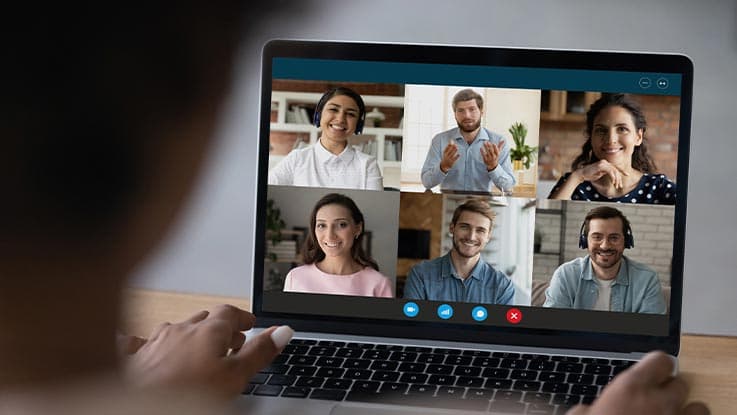
My first 500 Zoom calls

The new CEO of The Smith Family, Doug Taylor, reflects on his first three months in the job and how COVID has changed his approach to leadership.
Dough Taylor
Chief Executive Officer at The Smith Family
For the first three months of being the new CEO of a national organisation that has over 700 employees, and reaches almost 180,000 children and young people each year, I was unable to meet anyone professionally, in person. As a leader who started a new job during COVID lockdowns, it made me think about how this experience will change my approach to leadership.
When I was invited to join The Smith Family, I was looking forward to my first day in the office. I was keen to meet my team face-to-face and continue the good work of my predecessors.
I’d already started thinking through the objectives of my first “100 days”. Then came the lockdowns of NSW, Victoria and ACT. So, just like many other employees across our biggest states, my working days became wall to wall online meetings.
The upsides of working from home are well documented; time saved from not commuting and travelling to meetings. Working online, you can get to a lot more people more quickly (which is useful for a leader keen to be connected to people especially in challenging times). Communications are more democratised in online group meetings, so it’s easier to hear from everyone.
But, there are downsides. It’s hard to pick up on the non-verbal cues of team members, which is not great when you’re having important conversations. You also miss the chance encounters with colleagues in office hallways, which is where you really get a feel for the team and their work rhythms. And, when you’re not physically in the workspace of your organisation, you don’t see nuances such as office artefacts that are symbols for culture and tell you something about the place.
Still, I learned a lot, at a rapid rate. As well as diving into developing The Smith Family’s new five-year strategic plan, I built on my understanding of the scope and scale of the organisation’s work.
And there really was no time to waste. As the country’s largest charity supporting the education of young Australians experiencing disadvantage, there’s never been a moment in history when our education programs are needed more. At the heart of The Smith Family are children and families living in poverty, whose every purchase, from school books to internet access, to rental payments, is a struggle.
I’ve heard how lockdowns have magnified that struggle. Jobs have been lost, along with learning time, routines and social connections. However I’ve also been hearing about the resilience of the families we support, and their resolve to find a better future for their children through education.
As the first in my family to go to university, I understand the impact of education. My parents encouraged me to pursue education because of what it means for life opportunity. So I’ve been happy to be at my computer, hour after hour, encouraging the work of my team and being inspired by their commitment to the young people we support.
Since lockdowns ended, I’ve been reflecting on my approach to leadership, and how it’s changed. Never again will I equate working in an office alongside colleagues with the notion that that’s the only way to be with your team. In lockdown, I had to work hard to connect with people in all our offices, from Launceston, to Perth, to Katherine, to Newcastle. I also “met” donors, volunteers, school partners, as well as students and families we support. I’m not sure I would have done it as proactively had I been relying on my day-to-day connections in head office.
I also gained a lot from “dropping in” on online team meetings. I’ll keep doing this, because being at the coalface, I can hear regularly from my team at every level.
Writing Yammer posts each Friday that give a “shout out” to team members I’d met, and sharing what I’d been doing, also proved popular. This openness has created great opportunities to get feedback from colleagues and help them get a feel for where we’re going – and I’m also going to keep this up.
Finally, in the post lockdown world, my leadership will have a greater emphasis on team wellbeing. Lockdowns reminded all leaders that our team members have a life beyond their work and that their situation at home and in their community has a bearing on how they show up in the workplace. A leader who can speak to a colleague as a “whole person” has a much better chance of seeing their team have a higher level of engagement. People need to know from their leader that their health and wellbeing matters to them, and the organisation.
Long lockdowns in NSW, Victoria and ACT are now thankfully a thing of the past. Yet as I look back, surprisingly, the COVID restrictions enabled my early days at The Smith Family; I met more people, more easily, more often. But while I really enjoyed that, as a people person, I won’t deny I’m now thriving on seeing more of my team, more often, and face to face – and I look forward to getting out to meet the students and families we support, in person, in the weeks and months ahead.
Doug Taylor joined The Smith Family as CEO in August 2021. He has built a 25-year career in the social sector. Doug is a director of the Australian Centre for Social Innovation, WorkVentures and chair of Warakirri College – a school for disengaged young people in Western Sydney.
Originally published 1st December, 2021 on ProBono Australia
